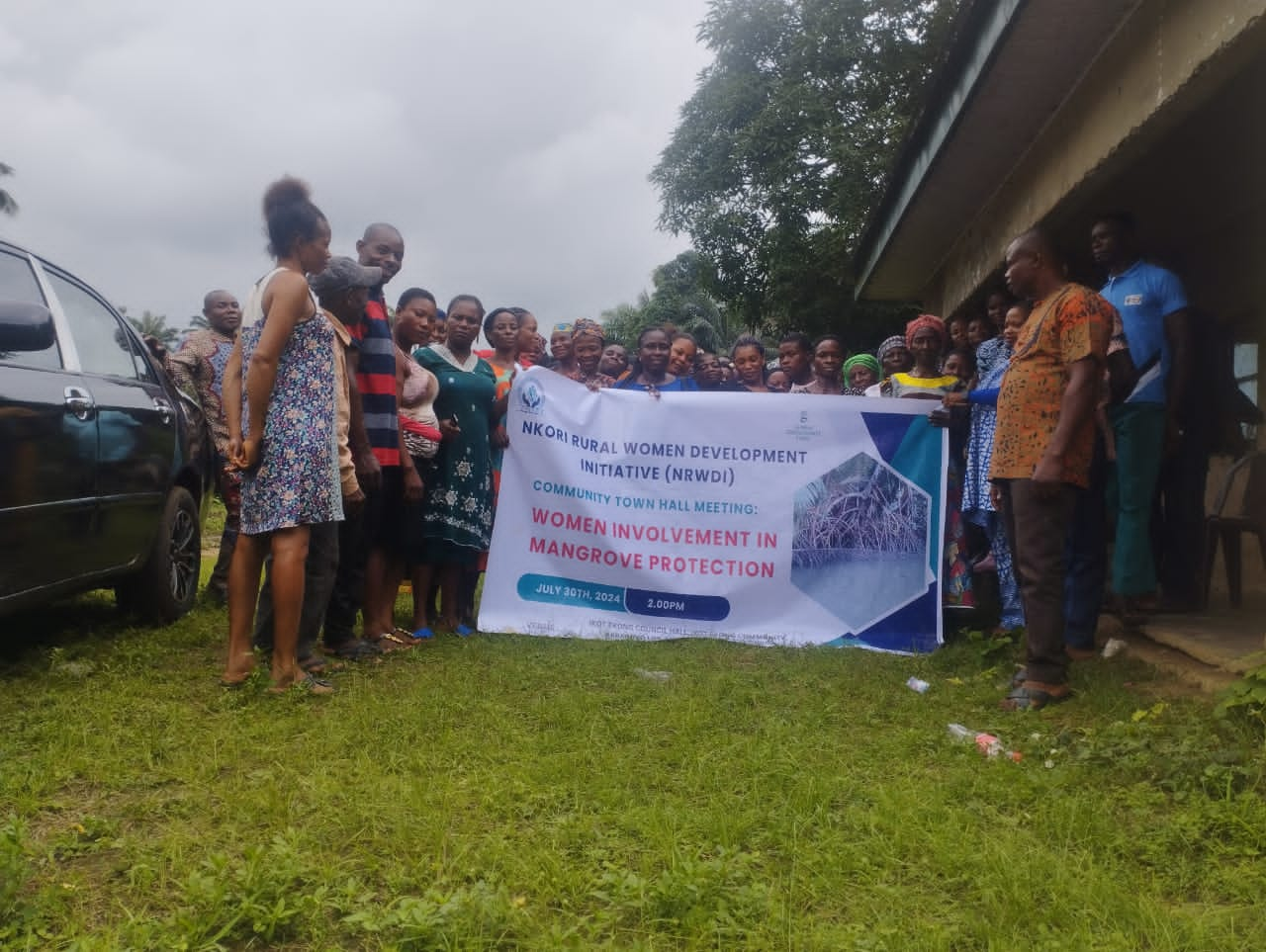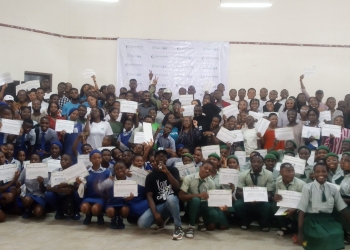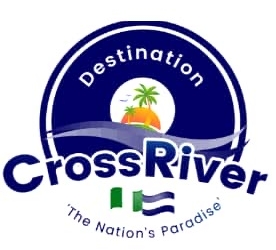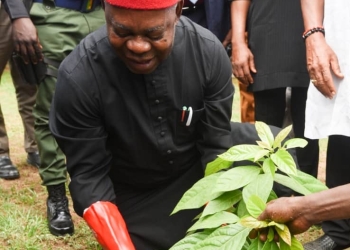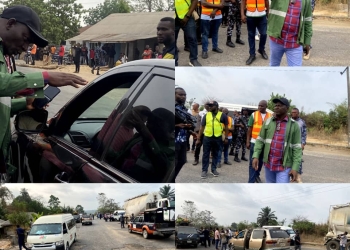Women of Ikot Ekong community in Akpabuyo LGA during the Town Hall meeting by NRWDI.
By Anietie Akpan
Rural women in Cross River State , Southern Nigeria have resolved to come together to protect and regenerate the mangrove as they brainstormed on the issues of mangrove conservation.
The women made this commitment at two Town Hall meetings put together by the Nkori Rural Women Development Initiative (NRWDI) with 120 women in participation. The meetings took place in Ikot Ekong community, Akpabuyo Local Government Area (LGA) with 65 participants and Ewa Ekeng community, 55 participants in Calabar South LGA of the state on July 30 and July 31, 2024 respectively.
The women agreed that the constant threat to the mangrove by humans and some natural factors is really affecting their aquatic life and means of livelihood as there is high level of deforestation of mangroves and invasion of Nipa palm.
Objectives of the Town Hall meetings were to understand the current level of women’s participation in mangrove-related activities within the community, identify the specific needs and constraints faced by women in accessing resources and opportunities related to mangrove conservation, to establish a platform for ongoing dialogue and collaboration among women and other community members on mangrove conservation and develop advocacy skills for effective environmental communication and promote leadership among women in climate justice initiative.
In her opening remarks, the Coordinator of NRWDI, Okoho Ene, said the meeting emphasized the interconnectedness of gender equity and environmental sustainability, highlighted the significant contributions of women in local communities towards mangrove protection and climate change.
Delivering a keynote address at the meeting in Ewa Ekeng, Mr. Akpa Agbo of the Cross River State Ministry of Environment, spoke on the ecological and socio-economic importance of mangroves, and the pivotal role of women in sustaining these ecosystems.
Panel discussion with the topic: “Women in Mangrove Conservation”, highlighted the challenges faced by women in mangrove conservation and strategies to overcome these challenges.
The panel which comprised environmentalists, community leaders, and policymakers, also discussed “the impact of empowering women on climate resilience” as this reflects the collective effort and commitment of the community towards a more inclusive and sustainable approach to mangrove protection and climate justice.
In an interview session after the meetings in the two communities, the NRWDI Coordinator said, the Town Hall meetings held at Ikot Ekong in Akpabuyo LGA and Ewa Ekeng community in Calabar South South LGA “to discuss on how to involve women in mangrove protection. This has to deal with building their skills of advocacy and making them understand why they need to be involved. Women need to be inclusive in anything that has to do with the environment.
“Our main focus is the mangrove community, which has to do with the way mangroves (commonly referred to as kerosene firewood) are destroyed, especially around the sea shores where some of them are using it as firewood but now we have made them understand it is not just a men affair because without the mangroves, seafood would not be available”.
For the Town Hall meeting at Ikot Ekong community, Ene said ,”we had about 65 town Hall meeting members, including their chiefs and here in Ewa Ekeng, we have about 55 town Hall meeting members. We call it a town Hall meeting by involvement of women in mangrove protection. This is to build their capacity in leadership and making them know that they need to be part of leaders in deciding what happens in the mangrove area and as they do it, they know that they are promoting climate justice”.
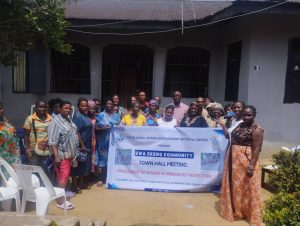
Ewa Ekeng community women during the Town Hall meeting by NRWDI.
On the threats to the mangrove, she stated that “with the way the mangrove is being cut down and Nipa palm is everywhere, you can see that the Nipa palm is invading the mangrove and soon, we are definitely going to have seafood scarcity because seafood is very scarce now. Recently, even periwinkle is scarce . During the discussion session, we also talked about regeneration of mangroves in these communities”.
Some of the community voices like Arit Bassey said “the salt water is creeping into our farmlands. My crops are dying, and I can’t feed my family.
“As a fisherwoman, I see the changes in our waters. The fish are getting smaller, and the tides are unpredictable. I always feel for the generation yet unborn”.
Another woman, Eka Nkoyo said, “protecting our mangroves is not just about preserving fish; it’s about protecting our future and the future of our children”
On her part, Madam Glory Effiong said that, “as women who depend on the mangrove for our livelihood, We should be involved and be given the opportunity to lead in its conservation and management.”
She stated, “it has come to realization that women are the backbone of our community. Their knowledge of the mangrove ecosystem is invaluable. It is time to recognize their contributions and empower them to take leadership roles in protecting our natural resources.”
One of the Chiefs, Francis Archibong, a farmer, said “I learnt something about the mangroves and climate change, now I know it is better to replace every mangrove tree we use with at least two or three more because if we fail to do this, it would affect the climate change we are talking about.
“There are also other ways we can avoid destroying the mangroves by making use of alternatives like gas etc. I think those are the things we need to inform the people of, that the method of using the mangroves as firewood can affect climate change and they should stop making use of those trees.
“We have less number of mangroves today as compared to the past because there has been no replacement. Here in Henshaw town community, we have limited number of mangroves around this marina(old Calabar) axis because there has been no effort to replace them. To my community, i advise that we plant more of it so that it will help us”.
For Mrs. Utang Umo Eyo Ita, she learnt much about climate change and “how we can stop the issues bothering our mangroves. We were told there is a plant called Nipa palm that disturbs our mangroves and as a result, we no longer have good fish in our waters due to the growth of this wild plant and our activities of cutting down the mangroves, so we want to put an end to all that and we would definitely spread this message. The mangroves are no longer there, they have all been cut off. I have really learnt a lot today”.
NRWDI is a non- Governmental and Non- Profit-making Organization with the mission of promoting and protecting the social rights of the most vulnerable people especially women and children, through community- based actions and education. NRWDI advocates, empowered and improve the socio-economic status of marginalized people, especially those in underserved communities in Nigeria.
